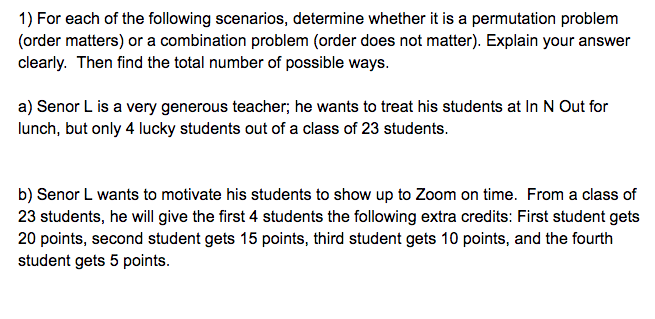1) For each of the following scenarios, determine whether it is a permutation problem (order matters) or a combination problem (order does not matter). Explain your answer clearly. Then find the total number of possible ways. a) Senor L is a very generous teacher; he wants to treat his students at In N Out for lunch, but only 4 lucky students out of a class of 23 students. b) Senor L wants to motivate his students to show up to Zoom on time. From a class of 23 students, he will give the first 4 students the following extra credits: First student gets 20 points, second student gets 15 points, third student gets 10 points, and the fourth student gets 5 points.
1) For each of the following scenarios, determine whether it is a permutation problem (order matters) or a combination problem (order does not matter). Explain your answer clearly. Then find the total number of possible ways. a) Senor L is a very generous teacher; he wants to treat his students at In N Out for lunch, but only 4 lucky students out of a class of 23 students. b) Senor L wants to motivate his students to show up to Zoom on time. From a class of 23 students, he will give the first 4 students the following extra credits: First student gets 20 points, second student gets 15 points, third student gets 10 points, and the fourth student gets 5 points.
Linear Algebra: A Modern Introduction
4th Edition
ISBN:9781285463247
Author:David Poole
Publisher:David Poole
Chapter2: Systems Of Linear Equations
Section2.4: Applications
Problem 28EQ
Related questions
Topic Video
Question
Can someone help me with these problems?

Transcribed Image Text:1) For each of the following scenarios, determine whether it is a permutation problem
(order matters) or a combination problem (order does not matter). Explain your answer
clearly. Then find the total number of possible ways.
a) Senor L is a very generous teacher; he wants to treat his students at In N Out for
lunch, but only 4 lucky students out of a class of 23 students.
b) Senor L wants to motivate his students to show up to Zoom on time. From a class of
23 students, he will give the first 4 students the following extra credits: First student gets
20 points, second student gets 15 points, third student gets 10 points, and the fourth
student gets 5 points.
Expert Solution
This question has been solved!
Explore an expertly crafted, step-by-step solution for a thorough understanding of key concepts.
This is a popular solution!
Trending now
This is a popular solution!
Step by step
Solved in 3 steps

Knowledge Booster
Learn more about
Need a deep-dive on the concept behind this application? Look no further. Learn more about this topic, probability and related others by exploring similar questions and additional content below.Recommended textbooks for you

Linear Algebra: A Modern Introduction
Algebra
ISBN:
9781285463247
Author:
David Poole
Publisher:
Cengage Learning


Linear Algebra: A Modern Introduction
Algebra
ISBN:
9781285463247
Author:
David Poole
Publisher:
Cengage Learning
